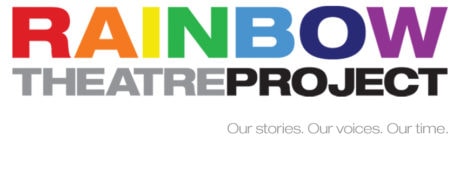Top and Bottom is a new gay comedy by Kevin Michael West and directed by Christopher Janson. It’s set in a hotel room where James, a wannabe “dom,” has planned an S&M-ish hookup with Tommy, supposedly a “sub.” My DC Theater Arts colleague Darby DeJarnette called the play “a comedy with brains and heart” and said the two actors, Ryan Townsend (who plays James) and Dimitri Gann (who plays Tommy), “are fantastic on stage together and bring a tenderness and understanding to their characters.”
That was precisely my impression too. Then I learned that Ryan and Dimitri are a real-life couple, and I guessed they might have an interesting story to tell. So late one afternoon before an evening performance, I met them in the DC Arts Center black box. They sat side by side on the bed they use in Top and Bottom. And as I listened I realized their experience with the play as a couple was even more intriguing than I had thought.
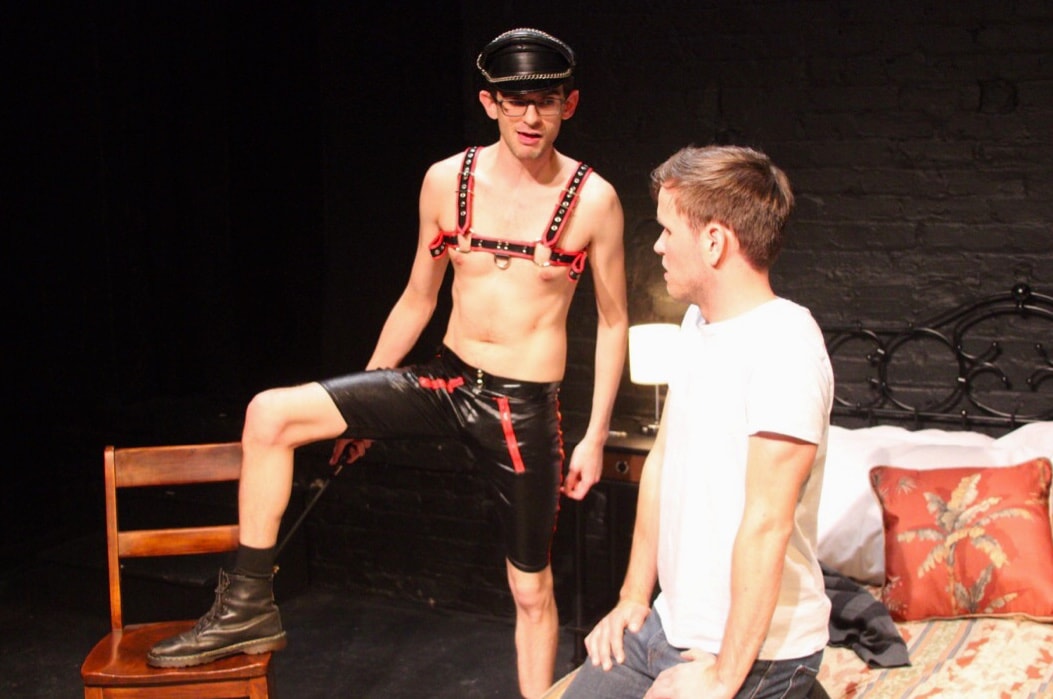
John: Let’s start with the characters you play. Who are they, and how do you relate to them?
Ryan: The first thing that I related to with James is how meticulous he is. He has a notebook of all his plans that he has for the evening. I have a notes page in my Macbook with all the plans I have, for not just my evening, but my life. So we’re very similar in that aspect.
Right at the beginning, you enter in a leather harness and accidentally you swat yourself with this riding crop and go ouch. It’s hilarious. And from that point on, we know this is a sendup of his attempts to be a top.
Ryan: Yeah, he’s been planning this moment, and dreaming about this experience, for years. But he hasn’t been able to actually have a dress rehearsal.
Dimitri: Tommy is much less concerned with the plan and how things are going to go because that’s not really up to him. That’s not his role in the bedroom. His job is to follow orders and be taken along on this whirlwind new adventure. He has a story about one of his previous sexual adventures, and it’s very much like: Take off all your clothes and get in the car, and then you’ll figure out what happens afterward.
This is the first time I’ve played a gay character on stage, my first time when I can relate like: Oh yes, he’s attracted to men, and I’m attracted to men, and I don’t have to transcribe my attraction and put it on this female and pretend that’s my thing. Very similar to Tommy, I had several years in my life where I was very much about the sexual adventure, the show-up-and-see-what-happens kind of thing. I was just going to be adventurous and try everything at least twice.
How do your characters meet?
Ryan: Craigslist.
What is the time period of the play?
Dimitri: Just a couple years ago.
Ryan: I have a very limited knowledge of the kink world, but I have a couple friends who are involved in it, and they do a lot of hookup things through Craigslist because that’s where you’ll find people who are into that.
You two are a couple.

Both: Yes.
How long have you been together, and how did you meet?
Ryan: It’ll be two years in May.
Dimitri: And we met on Tinder.
Ryan: Yeah. My best friend was on Tinder, trying to find herself a man to see, and we enjoyed swiping people away because that’s what you do. You swipe people left or right. And when I would leave her place, I would think, “Well, I want to swipe people away.” So I was doing it not even looking for anything serious—and Dimitri was the only person I’ve met from Tinder.
Awww.
Ryan: A hundred-percent success rate.
Have you worked together in the theater before?
Ryan: No.
Dimitri: This is our first time together.
Did you audition together, as a package?
Ryan: No.
Dimitri: We couldn’t make the audition call together.
So, did Chris [Christopher Janson, the director] put you together?
Ryan: He knew that we were dating. I think I had dropped that in an email.
But you both read the play and knew that you wanted to go for it?
Ryan: Mm-hm.
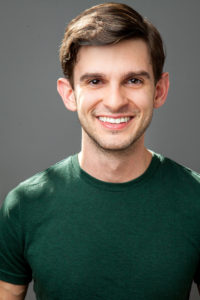
Did you go for the parts you got?
Ryan: No.
Dimitri: I went for the other part.
Did you go for the other part too?
Ryan: Yeah.
Oh, gosh.
Dimitri: Yeah.
That’s too funny.
Ryan: Chris called us in for both parts. But then as we were reading the play, I’m like, “Oh, well I’m Tommy because I’m bossy, and I’m judgy, and that’s who I am.” And Dimitri’s much more sweet and nice and kind. So I was like, “Well, you’re the James, I’m the Tommy.” But I think it worked itself out properly.
Dimitri: Yeah, once we started rehearsing, it was like, “Oh, wait. No, no, no, you’re definitely the James.”
Ryan: Yeah, I’m one hundred percent James.
Dimitri: You’re not Tommy.
Ryan: I am so not Tommy.
What for each of you has been the hardest part of this play, and what’s the most fun part?
Dimitri: For me, the hardest part at first was the space. It’s very challenging to an actor but also very rewarding because it’s so small. I do a whole monologue where I’m essentially in that guy’s lap over there [points to front row]. It’s almost six or seven minutes. It’s me just talking. So that was hard.
A very fun part of this show has been getting to reacquaint myself with my sense of comic timing. I really enjoy making people laugh and having those funny bits and the work that goes into that. It’s hard to be funny on purpose night after night after night. It takes a lot of work, but it was really fun to get the timing down, and get the bits down, and work through it and make it funny, but keep it real and be in the moment, and have that happen to be funny.
Ryan: The hardest part for me has been my ending monologue. It’s difficult because it’s so layered. There’s a lot to play with in the monologue, and it’s so different because the rest of the show is me being fumbly and a klutz and nerdy, and this is a moment where it’s very tender and very revealing.
The most fun thing is definitely the comedy, to hear the laughter. When we would do something funny in rehearsal and Chris or Deb [Deborah Gur] our stage manager would just have a belly laugh, it was like, “Oh, well that was a good choice. Okay, cool. Let’s put that in my back pocket.”
Tell me about audience reactions. How have they been?
Ryan: Varied. There have been some that just love it. When I put the dildo on the wall, that always gets a good laugh. But there was one day where they didn’t laugh at anything, and for a comedy, that’s what you thrive off of. It was weird.
Dimitri: The monologue that Tommy has at the end is very intense, and some nights, I’ll get very visceral, emotional reactions out of people; I’ll hear people gasp.
There’s a scene where I am totally naked, and right before that moment happens, I can hear a lot of whispering because everyone’s like, “Oh, this is the thing that they were talking about—”
Ryan: We heard someone legitimately saying, “Are we going to see his penis?”
Dimitri: And I almost lost it.
Ryan: I wanted to turn around and say, “Yeah.”
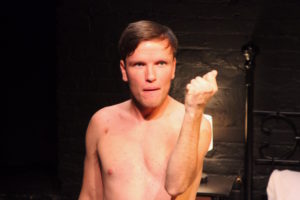
What was that nude scene like for you?
Dimitri: It was on my stage bucket list to be naked in a play. I’ve always wanted to do it because I had friends that did it. We did Equus at my college, and besides that being a wonderful play my friend got to be naked on stage, and I thought that was such a wonderful, vulnerable thing.
I thought it was going to be more difficult than it was. We didn’t really start rehearsing it nude until the week before we opened, and when we started doing it, it was just like it was in the moment, and we just did the scene, and everybody was cool about it. There was a little bit of nerves opening night, because like, “Oh, I’m in front of people now.”
Ryan: I think some people do come in and they don’t expect the nudity, but it’s very brief. He’s not naked very long.
So what’s it like for you when Dimitri’s in the scene nude?
Ryan: It’s whatever. Old news.
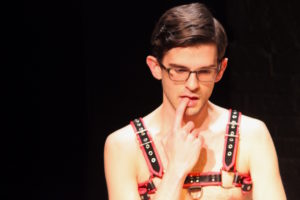
What do you think Top and Bottom is saying about power dynamics between people in the bedroom?
Ryan: I think it normalizes the stigma that might be behind something like BDSM [dominance and submission] because we see these two people that you could meet any day on the street. The character I play is wearing glasses and is super nerdy and not the type you’d think would be into kink, but he is. So the play suggests, “Oh, maybe that’s not such a taboo thing.”
Dimitri: We got to read the whole play beforehand.
Ryan: Yeah, before the audition, Chris sent us the whole play.
Dimitri: And one of the things that I immediately was drawn to was that it dispels a lot of the ideas that we, especially as gay men, tend to have about what a top should look like, what a bottom should look like, what giving in to control really is about versus what people think it’s about.
Before this show, I always thought like, “Oh, well, BDSM is a way-over-there thing because it’s somebody completely relinquishing all control and kind of putting themselves below. But that’s really not what it’s about. The two characters ultimately are on a journey to discover how important it is to have a balance of that control and that even for someone who’s a sub [submissive], there is a control about when they decide to give themselves over, and then, that’s where they get the balance from.
Ryan: Tommy’s the bottom one, the submissive one, but he’s calling the shots most of the time. And even though James’ role is the top, dominant person, he has no idea what he’s doing.
Kevin Michael West, the writer, said he got the idea for the play when he met a guy for a hookup, and they went to his place. And when they got there, the guy wanted Kevin to tie him up, but Kevin wasn’t into it and was really bad at it, and the humor that arose in that moment he expanded into the play. And it’s very, very funny—
Ryan: Because it’s real.
It comes from the fact that these characters aren’t good at it either.
Ryan: Yeah.
And as it turns out, at the end, they don’t seem too into it or committed to it either.
Ryan: It transcends that.
It goes to some other place.
Ryan: Yeah.

How much of what these characters desire is their real emotional erotic longing, and how much is it trying to act out how they think gay men should act?
Ryan: Well that’s sort of psychological. You could think: I want this because it’s the way I’m supposed to be or this is the way it’s supposed to be so I should want that. My character has never done this before, so how does he know how a dominant top person is supposed to act?
And how did he learn what he thought he should be able to be good at? There’s no mention in the play of porn, for instance.
Ryan: Yeah. But that’s probably where he gets a lot of these ideas. There are also websites that are dedicated to BDSM culture. So he’s either read things or seen things like pornography that give him this glorified idea of what it’s supposed to be. That’s why it’s funny when I walk out and I’m this skinny guy and I put on this low voice when I’m being my top dominant personality. But then I talk normally, and it’s like this light little nasally voice.
So maybe he had to learn to want it in order to fit into the culture?
Dimitri: I think for Tommy, it was very evident as he flowered and blossomed into his sexual self that he wanted to try everything. It is very similar to my own story. I remember coming out right before I turned 18 and thinking, “Oh, man, I’ve got some catching up to do.” I saw all my other friends were starting to get into longer-term relationships because they’d had practice, and they were starting to have sex.
And going to college, I just went, “Whoo!” I’m very similar to Tommy in that respect. He’s a person who learned from going out and doing it a bunch and getting into what he liked. He’s good at putting on the mask of life. He talks in the play about liking other people being in charge. But how much of that was at first purely the attraction to it or whether he learned how to be into it? I wonder sometimes whether he does it because he really likes it, or because he found that’s what he was being wanted for.
What would you like audiences to take from this show?
Ryan: I think what you say at the end of your last monologue is a theme we want people to take away.
Dimitri: Okay. Minor spoiler alert. I have a monologue at the end that really captures what this show’s about, and it’s: “find out who you are, and then love yourself for who you are.” That’s the journey that these characters take: hiding behind this whole thing that they do—the scene, the fantasy of it all—and then through this story coming to a place of greater acceptance of themselves and the ability to love themselves.
Which brings me to my last question: What have you and your offstage relationship gained from working together on this show?
Dimitri: Well, we learned that we can get through a lot of stressful parking nightmares—
Ryan: Oh, my God.
Dimitri: —without killing each other, which is great. A lot of forgiveness of the snippiness there.
It’s been such a team effort, and we get to spend a lot of time together. Normally, when one of us is in a show or when both of us are in shows—like six months ago, we were both in shows that were very far away from where we lived, and we saw each other an hour a day—
Ryan: An hour a day.
Dimitri: —which was the drive home from the shows, and that was it, and we’d go to bed, and I’d wake up and go to work. So it’s been really nice to be in the same—
Ryan: Lots of hang-out time.
Dimitri: Yeah, which has been really nice because we don’t get much of that.
Ryan: We just moved here from South Florida in January, so this is a nice “Hey, we’re in this together” situation.
Oh, that’s sweet.
Ryan: Our lovely stage manager, Deb, posted a picture of us in rehearsal one time, and she said, “Hetero or homo, you’re going to relate to both of these characters.” And I think that’s really true because like that line Dimitri says about loving yourself and accepting yourself for who you are: everybody needs to do that.
You think, “Yeah, these characters are gay. These characters are into BDSM,” but the show isn’t about BDSM. This show isn’t about us being gay. For my character, it’s about accepting that he is who he is, and it’s not shameful, and he needs to embrace that.
I hope anyone out there who comes to see the show, and is questioning who they are, in any aspect, can be like “You know what? Maybe it is okay. Maybe this part of me is okay.”
Thank you, guys.
Ryan: You’re welcome.
Dimitri: Come see the show. It’s really good.
Running Time: One hour, with no intermission.
Top and Bottom plays through April 29, 2018 at the DC Arts Center— 2438 18th Street NW, in Washington, DC. Tickets can be purchased online.


